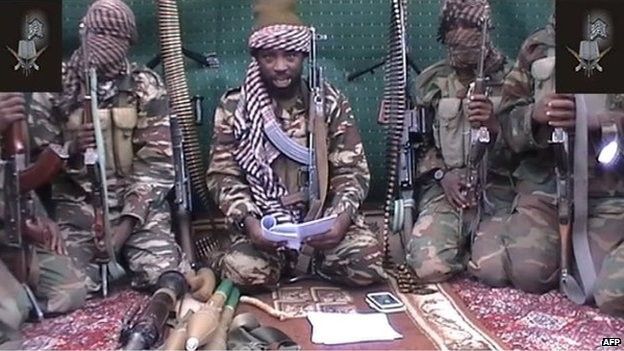
This article is more than
9 year oldSome 50 girls wearing headscarves are seen behind a Boko Haram militant who demands the release of fighters in return for freeing the girls.
The militant also says some of the girls have been killed in air strikes.
The group seized 276 final-year girls from their school in the northern town of Chibok in April 2014.
Boko Haram is believed to still be holding more than 200 of those kidnapped.
The video begins with a shot of a masked man, carrying a gun, speaking to the camera. He says that some of the girls have been wounded and have life-threatening injuries, and that 40 have been "married".
"We don't want to do anything with these girls, our demand remains the same," he says in the Hausa language.
"We want the government to release our fighters who have been in detention for ages; otherwise, we will never release these girls."
The video concludes with footage of bodies, said to be the victims of air strikes, lying on the ground at another location.
The militant also carries out a staged interview with one of the captives, who calls herself Maida Yakubu, in which she is apparently used to convey the group's message to the government.
"What I can say is that our parents should take heart," she says. "Talk to the government so that we can be allowed to go home."
Maida's mother, Esther, is one of several parents of Chibok girls who recently published open letters to their daughters detailing the pain they feel at their children's absence and their hopes for the future.
Chibok abductions: What we know
Chibok girl's life with Boko Haram
Another girl among those standing in the background can be seen with a baby. It is feared that many of the schoolgirls have been sexually abused and forced into "marriage" by their captors.
Boko Haram has waged a violent campaign for years in northern Nigeria in its quest for Islamic rule, and a faction of the group recently pledged loyalty to so-called Islamic State.
Thousands of people have been killed or captured by Boko Haram, whose name translates as "Western education is forbidden".

Boko Haram has always maintained that the Chibok girls were safe and would only be released if the Nigerian government gave in to its demands.
Through this video, the group is again trying to make the government look like the villain for carrying out air strikes on the militants, which it claims have backfired and hit the abductees instead.
Reigniting public sympathy for the girls might be an attempt to force the government to listen. Boko Haram is attempting to paint the military campaign against the jihadists as a failure.
It is also significant that this video comes shortly after a split in the group, with one faction maintaining that it is the true regional branch of the so-called Islamic State.
The video indicates that the other faction, led by Abubakar Shekau, is the one holding the Chibok girls and so it will use this to show why it cannot be ignored, even if its rivals have foreign backing.
The failure to bring about the girls' release has caused international outrage.
The Nigerian government, which has sought help from the US and the UK, has been heavily criticised for not finding them.
The military has in the past insisted that it knows where they are and said it would bring them back soon, but has then been forced to withdraw claims to have found some of them.

The video is the first such since CNN obtained footage in April purportedly showing 15 of the girls.
The Chibok girls had been thought to be in a heavily forested area of northern Nigeria.
A girl said to be one of those captured, Amina Ali Nkeki, was found wondering in the Sambisa Forest in May by an army-backed vigilante group. But the exact circumstances of what the government initially termed "her rescue" were unclear.
Other claimed sightings of the the girls remain unconfirmed.